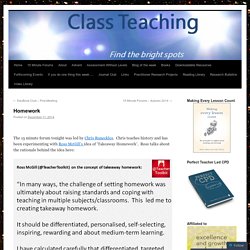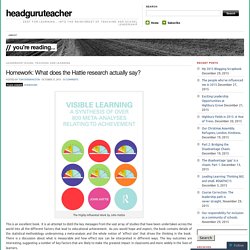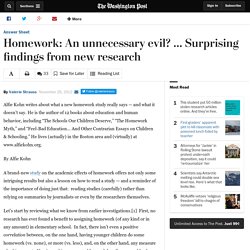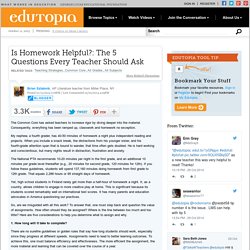

Homework. The 15 minute forum tonight was led by Chris Runeckles.

Chris teaches history and has been experimenting with Ross McGill’s idea of ‘Takeaway Homework’. Ross talks about the rationale behind the idea here: The history and geography departments have been trialling takeaway homework with Year 8. This came about because there was a feeling that homework in KS4 was highly structured and purposeful, based around providing opportunities for students to practise key exam skills. In KS3 however, it was more ad-hoc and so less purposeful. “So, what Hattie actually says about homework is complex. The more specific and precise the task is, the more likely it is to make an impact for all learners. . – Homework: What does the Hattie research actually say? So, the principle of takeaway homework is quite straightforward. Embed what they have learnt in lessons.Extend and develop their thinking.Engage them with the learning. Chris shared the example above. Like this: Like Loading... Homework: What does the Hattie research actually say?
The Highly Influential Work by John Hattie This is an excellent book.

It is an attempt to distil the key messages from the vast array of studies that have been undertaken across the world into all the different factors that lead to educational achievement. As you would hope and expect, the book contains details of the statistical methodology underpinning a meta-analysis and the whole notion of ‘effect size’ that drives the thinking in the book.
There is a discussion about what is measurable and how effect size can be interpreted in different ways. The key outcomes are interesting, suggesting a number of key factors that are likely to make the greatest impact in classrooms and more widely in the lives of learners. My main interest here is to explore what Hattie says about homework. Research cited for younger children. Homework: An unnecessary evil? … Surprising findings from new research. Alfie Kohn writes about what a new homework study really says — and what it doesn’t say.

He is the author of 12 books about education and human behavior, including “The Schools Our Children Deserve,” “The Homework Myth,” and “Feel-Bad Education… And Other Contrarian Essays on Children & Schooling.” He lives (actually) in the Boston area and (virtually) at www.alfiekohn.org. By Alfie Kohn A brand-new study on the academic effects of homework offers not only some intriguing results but also a lesson on how to read a study — and a reminder of the importance of doing just that: reading studies (carefully) rather than relying on summaries by journalists or even by the researchers themselves.
Let’s start by reviewing what we know from earlier investigations.[1] First, no research has ever found a benefit to assigning homework (of any kind or in any amount) in elementary school. Second, even at the high school level, the research supporting homework hasn’t been particularly persuasive. 1. 2. Is Homework Helpful?: The 5 Questions Every Teacher Should Ask. Posted 10/13/2014 5:16PM | Last Commented 12/02/2014 4:29PM The Common Core has asked teachers to increase rigor by diving deeper into the material.

Consequently, everything has been ramped up, classwork and homework no exception. My nephew, a fourth grader, has 40-50 minutes of homework a night plus independent reading and projects. When you include a snack break, the distractions from his younger sister, and his fourth-grade attention span that is bound to wander, that time often gets doubled. He is hard working and conscientious, but many nights result in distraction, frustration and anxiety. The National PTA recommends 10-20 minutes per night in the first grade, and an additional 10 minutes per grade level thereafter (e.g., 20 minutes for second grade, 120 minutes for 12th). Yet, high school students in Finland rarely get more than a half-hour of homework a night. So, are we misguided with all this work? 1. Yet, here’s the rub. 2. Why I Don't Assign HomeworkThe Educator’s Room. Homework: The eternal struggle of student, parent, and teacher.

I see it all over my Facebook feed and Twitter feed. The lament of parents bemoaning the amount, the complexity, or the sheer ridiculousness of their children’s homework. Homework seems to be the bane of everyone’s existence, doesn’t it? Teachers hate grading it; students hate doing it; and parents hate begging their kids to do it. So why is it a thing? I will admit up front that as a high school teacher I give very VERY little homework. I started asking myself questions starting with “If a vast majority of my students are not doing the homework, what is that homework for?” And if the homework isn’t necessary to passing the class, why am I assigning it? And if it is what makes a child FAIL my class, is their grade really reflective of their ability to meet the standards of my class or is it reflecting their irresponsibility/lack of resources?